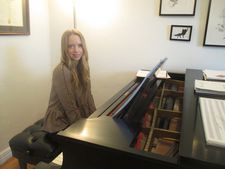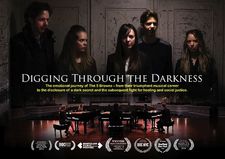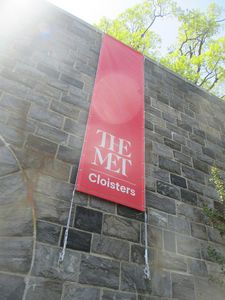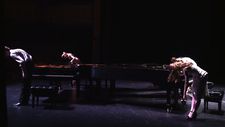When I met with Desirae Brown at her apartment, she made a Juilliard connection for The 5 Browns (siblings Desirae, Deondra, Melody, Gregory, Ryan) to Nico Muhly and Isabel Leonard, the star of the opera Marnie, directed by Michael Mayer, currently at The Metropolitan Opera in New York. In the first installment of my conversation with Desirae, she reveals that she loves playing Peer Gynt with Deondra, who co-founded The Foundation for Survivors of Abuse with her and the importance of taking control to survive abuse.
 |
| Desirae Brown on performing Peer Gynt: "That's probably my favourite part. I do love playing with Deondra and I remember being there." Photo: Anne-Katrin Titze |
Julianne Moore, Scott McGehee and David Siegel's What Maisie Knew, Spice Girl Geri Halliwell's World Walkabout, and how "things moved very quickly" in 2000 when The New York Times published the article Fugue for Five Pianos: Siblings Excel Contrapuntally are discussed not far from where The Cloisters part of The Metropolitan Museum of Art's Costume Institute exhibition Heavenly Bodies: Fashion and the Catholic Imagination, curated by Andrew Bolton was held.
What begins as a music documentary about five sibling pianists from Utah who all studied at Juilliard and toured the world together as The 5 Browns, soon turns into a very different kind of exploration. After returning to the US from a stressful tour in Japan, one night in a shared hotel room, Desirae Brown, the oldest, asked her sister Deondra if she had been abused as a child by their father Keith, who had been for a while also their manager. The answer sends shockwaves through the family structure when all three daughters, including Melody, the youngest, share with each other that they were systematically abused as children. No one in the family had dared to go there before.
Ben Niles's affecting The 5 Browns: Digging Through the Darkness juxtaposes extensive interviews with the sisters and their two brothers, Gregory and Ryan, in the present, as well as their by now estranged mother Lisa, with home videos from their childhood, concert footage, and television appearances where they presented the façade of the cheerful, loving clan. We learn about Desirae and Deondra's foundation and the important work that they are doing to change the statute of limitation laws on child abuse.
The last time I was up this far north in Manhattan was on the first Monday in May for the press preview of the Costume Institute's Heavenly Bodies: Fashion and the Catholic Imagination when we were bused from The Metropolitan Museum of Art to The Cloisters for the continuation of the exhibit. When I told Desirae this, she commented on how much she too enjoyed the exhibition.
Anne-Katrin Titze: The Cloisters are around the corner from your apartment. I think I recognise this painting over there from the documentary.
Desirae Brown: Yeah, we did part of my interviews here.
AKT: When did Ben Niles start filming you?
DB: It's probably about three years ago. 2015 or '16, it was in the fall because we were about to start touring.
AKT: How did he find you? How did the film come about?
DB: Steinway sometimes do concerts at the factory out in Queens for the craftsmen and women who create the pianos.
AKT: And Ben Niles did a documentary about Steinway, didn't he?
DB: Yes, he did. So they had hired him just to film the performance. We played a few pieces. That's how we met him. We liked the work that he did. He was able to capture the expressions, like the looks that we give each other while we're playing. And his documentary Note By Note [The Making Of Steinway L1037] was really beautiful.
 |
| The 5 Browns: Digging Through The Darkness |
AKT: The footage when the three of you [the sisters] are playing Clair de Lune - is that by him or archival?
DB: There's a video that we have in a cave but he filmed us playing Clair de Lune in a soundcheck on stage.
AKT: That must be it. There's no cave, it's the three of you and it captures your hands so beautifully. The film works in layers. How does it feel watching the scenes with your mother?
DB: Hard. It's hard to see her. But we're so familiar with her arguments or excuses or the way she has dealt with the abuse. And tried to normalise or make it more casual than it actually is - that wasn't a surprise to see in the footage in the film.
AKT: You recognised what you already knew?
DB: Yeah, it's not surprising.
AKT: In a way, she is still covering up. When she is talking over your father's voice on the phone - she is even covering up that way.
DB: Yeah, that's true.
AKT: You say at one point that talking makes you feel less powerless.
DB: Yes, less powerless. I think a large part of healing for survivors and for Deondra and me was taking back the control in your life. because when you're being abused you don't have control. Trying to change the laws makes me feel more like trying to take control back in a way.
AKT: The 60 Minutes footage showing the facade of the happy family says a lot about the PR world we live in. How much is really going on behind closed doors, we'll never know.
DB: Absolutely because I think people have this idea that perpetrators or child abusers are like these scary people in a bad part of town. When in actuality child abusers are likely to be college educated, white collar, dynamic, liked people in their communities that people would never guess. I mean, how well do you ever really know anyone?
AKT: The statistics at the end say one in four girls is abused before the age of 18?
DB: Yes. Often when I'm just in a room with people or on a train, any space where people are gathered, and I'm like, one in four girls, one in six boys - it's a lot. Everybody knows somebody whether they know it or not.
AKT: It is also the question of memory, isn't it? Did you have a moment when your memory came back or was it always there?
DB: It's always there, you just choose not to think about it. I think, because our abuse happened when we were a little bit older. I've met survivors who were abused when they were very, very, very young.
 |
| The Metropolitan Museum of Art at The Cloisters for the Costume Institute Heavenly Bodies: Fashion and the Catholic Imagination exhibition Photo: Anne-Katrin Titze |
Then memory becomes a more complicated thing to wrap their consciousness around. But for us, I remember things from when I was 11, 12, 13, 14, 15 very well. It was never a question of whether it happened or not. It's just that I didn't choose to think about it.
AKT: Melody in the film mentions a moment looking in the mirror.
DB: Yeah, she hadn't thought about it for so long and then all of a sudden she's like, wait, yeah. As an adult, all of a sudden you're looking back on a memory and you're like, you know, that's not right. The problem is, abusers try to make the abuse seem normal. And as a child you don't know what is normal.
That's why Deondra helped pass a bill in Utah to have sex abuse prevention taught in the public schools, so that kids can be taught what's normal and what's not normal. Because that's a big tool that abusers use.
AKT: Yeah, you grow up in a house and you think that's it, that's normal. Did you ever see the film What Maisie Knew, based on the Henry James short story?
DB: I remember the title.
AKT: It's from a few years ago. Everything is told from the perspective of the little girl. At one point she has a friend stay over and her parents always have these wild parties [her mother is a rock star played by Julianne Moore], which for Maisie is totally normal, her mother doing drugs, for example. But it's not normal for the friend.
In the documentary on you and your siblings, The New York Times article [Fugue for Five Pianos: Siblings Excel Contrapuntally; Two Brothers and Three Sisters Attend Juilliard at Once] from 2000 is mentioned when you were all at Juilliard and suddenly became famous.
DB: Things moved very quickly. I think we've had 120 concerts that first year performing together. A lot of pressure. We loved to play classical music, the rest of it you just do to keep the machine going.
![Desirae Brown on the creator and star of Marnie: "Nico Muhly was one of our classmates [at Juilliard]. And we were also classmates with Isabel Leonard."](/images/newsite/Marnie_opera_poster_1_225.jpg) |
| Desirae Brown on the creator and star of Marnie: "Nico Muhly was one of our classmates [at Juilliard]. And we were also classmates with Isabel Leonard." Photo: Anne-Katrin Titze |
AKT: I looked at that article this morning. It felt strange, as if I were doing some detective work. There is a line about your father Keith having a head wound because one of the pianos was in your parents' bedroom too close to the bed. It felt like the return of the repressed. Of course it's not the timing.
DB: But lots of enmeshments!
AKT: Speaking of those, have you seen Nico Muhly's Marnie?
DB: I haven't seen Marnie yet! Melody and Gregory and Ryan are going on, I think, Wednesday.
AKT: I was at the dress rehearsal.
DB: You were? How was it?
AKT: It's great. I know Michael Mayer, the director, and he did some fabulous things with it.
DB: Oh, we worked with Nico Muhly in the past. He wrote a five piano concerto for us that we premièred with the Chicago Symphony Orchestra. Nico Muhly was one of our classmates. And we were also classmates with [Mezzo-soprano] Isabel Leonard.
AKT: Wow, I didn't know that. Marnie, the opera, is not based on the Hitchcock movie, but on the novel [by Winston Graham] the movie was based on. It's a bit different in Nico's opera; she is surrounded by four Marnettes and there is a different kind of trauma her mother instilled in her.
DB: Oh, that will be significant for my siblings.
AKT: Julianne Moore's praise is on the postcard for the film. Did you get to talk with her?
DB: I haven't talked with her. That was what she gave to the director after she watched it. She wrote a beautiful lovely note. She's such a great advocate also.
AKT: The archival footage includes Geri's World Walkabout.
DB: Yeah, Geri Halliwell, the Spice Girl.
AKT: Yeah, I recognised her. It's quite a collection from childhood home movies to this - the healing quality of music comes through there. If you hadn't had that.
DB: It probably would have been very different. Statistically, more survivors than not will have a lot of difficulty with, like, substance abuse and promiscuity and mental health issues. And my sisters and I actually are like pretty high functioning.
What makes the difference I don't know, because we've been doing music the whole time. There are healing properties in music - Deondra says that in the film. Actually probably healing our brain physically. But then also just having our lives regimented aground it?
AKT: Structure.
DB: Clear goals. Structure. We've been so goal oriented and disciplined our whole lives, that I think really helped us get through difficult times because there wasn't really an option when you have that many concerts.
AKT: A beautiful scene, for me, is the Peer Gynt moment with you and Deondra playing as children and now. It's light and wonderful because it feels like you are recovering the good parts of the childhood.
DB: That's probably my favourite part. I do love playing with Deondra and I remember being there. And I find I liked playing it then and I like playing that piece now with her. It's like it has nothing to do with the abuse, right? It's our own thing.
Sonic Cinema DOC NYC screening of The 5 Browns: Digging Through The Darkness - Sunday, November 11 at 10:45am - SVA Theatre; Expected to attend: Ben Niles, Desirae Brown, Deondra Brown, Melody Brown, Gregory Brown, Ryan Brown
Coming up - Desirae Brown on The Foundation for Survivors of Abuse, her activism with Deondra Brown to deal with the statute of limitation laws for crimes of childhood sexual abuse, and how it's "easier sometimes to help other people than yourself."
Nico Muhly's Marnie at The Metropolitan Opera in New York will run through November 10.
The 5 Browns: Digging Through The Darkness opens in January at New York's IFC Center.









![Nico Muhly with librettist Nicholas Wright at the dress rehearsal for Marnie at The Metropolitan Opera - Desirae Brown: "He [Nico] wrote a five piano concerto for us [The 5 Browns] that we premièred with the Chicago Symphony Orchestra."](/images/newsite/Nico_Muhly_Nicholas_Wright_225.jpg)















